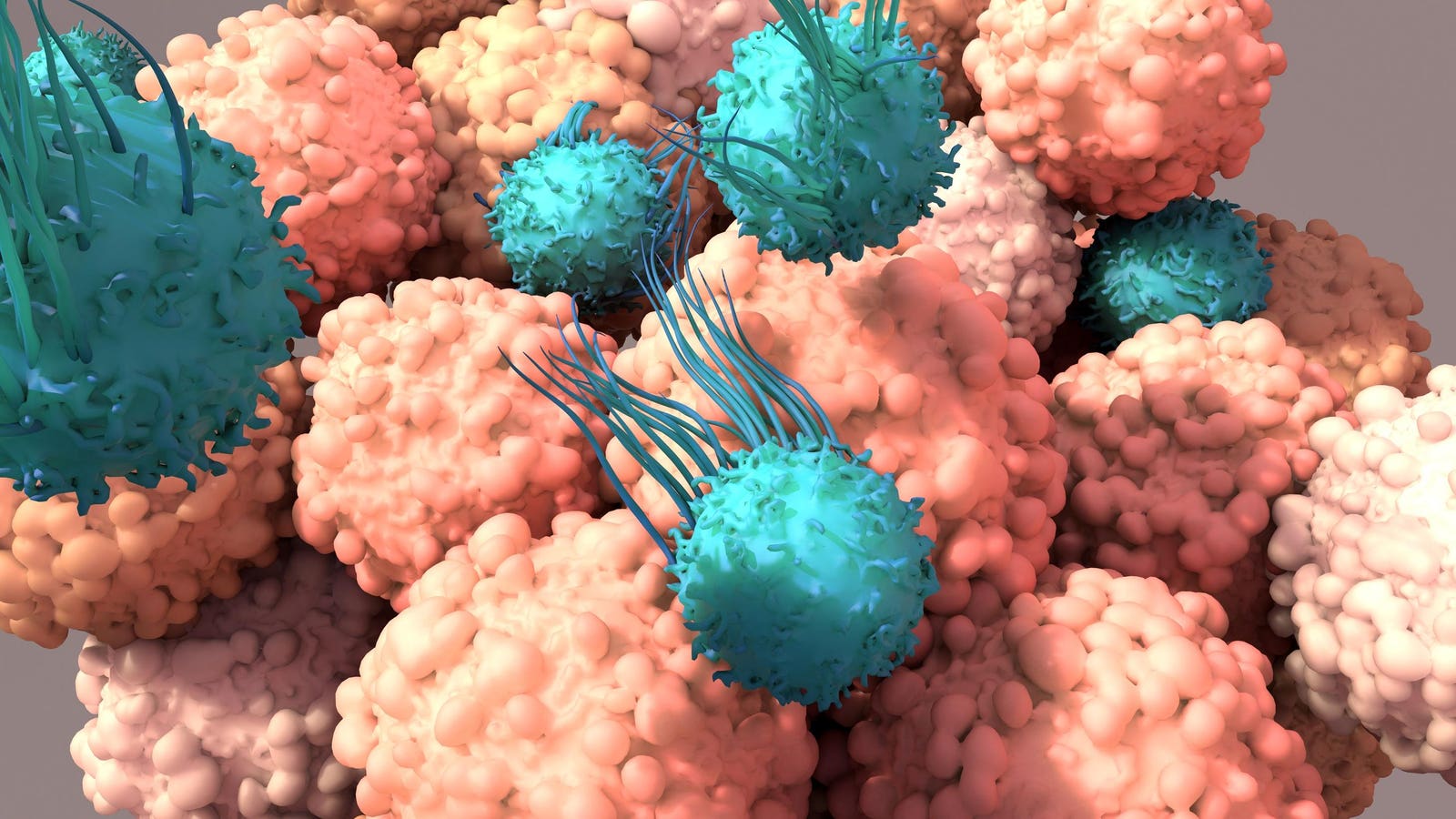Health
Ipilimumab, a groundbreaking breakthrough in cancer treatment

3D rendering of T cells (in blue) attacking cancer cells (in pink)
In 2011, the first of a new generation of anticancer drugs called checkpoint inhibitors was approved. The drug, known as ipilimumab or Yervoy, was separate from standard cancer treatments. It worked by thwarting a cancer cell’s ability to fend off attacks from immune cells. A new era of cancer care emerged as several other checkpoint inhibitors followed the official introduction of ipilimumab. Although initially intended to treat advanced melanoma, today doctors can offer ipilimumab and other checkpoint inhibitors to treat various types of cancer.
This article describes how ipilimumab works, which cancers it treats and what developments may occur in the future.
How Ipilimumab works
Ipilimumab (pronounced ih-pih-lih-moo-mab) is a cancer drug delivered into the bloodstream through an intravenous line (IV). The infusion is filled with antibodies that block a certain type of protein found on the surface of immune T cells, called immune checkpoints. This blocking interaction stimulates white blood T cells to gather against tumors. Understanding how immune checkpoints typically work is integral to recognizing the impact of this drug.
Why checkpoints are important
Immune checkpoint proteins are proteins that naturally occur on immune T cells. These proteins are often described as a ‘brake system’ of the immune system. Just like brakes slow an oncoming car, immune checkpoints dampen T cell activity. They protect against overactivation, where overstimulated T cells risk damaging healthy tissues.
If checkpoint proteins are a natural part of the immune system, what need is there for checkpoint inhibitors?
The problem is that cancer cells co-opt this mechanism for their own gain. They bind checkpoint proteins to disable T cells that would otherwise normally take revenge on the tumor. This is one of the many tactics cancer cells use to multiply unchecked.
Block the checkpoint
This is where checkpoint inhibitors work their magic. Ipilimumab binds to a specific checkpoint protein and blocks its access. This prevents cancer cells and other immune cells from deactivating the T cell. Freed, the T cell is free to activate, expand and counteract the tumor. Figure 1 illustrates the mechanism of this drug.
Figure 1: Ipilimumab checkpoint inhibitor mechanism. The ipilimumab antibody blocks the cytotoxic T … [+]
Why Ipilimumab is unique
Ipilimumab works in a unique way compared to other checkpoint inhibitors. Of all the checkpoint inhibitors on the market, ipilimumab is the only federally approved inhibitor that targets a specific checkpoint protein called CTLA-4, or cytotoxic T-lymphocyte-associated protein 4. Because this protein works differently than other immune checkpoints, ipilimumab elicits a different effect . antitumor response than other checkpoint inhibitors.
The only other checkpoint inhibitor that targets this protein is tremelimumab (Imjudo) by AstraZeneca; However, unlike ipilimumab, it is used very conditionally. Tremelimumab should be given with another checkpoint inhibitor to treat people with surgery-resistant liver cancer.
When is Ipilimumab used?
Ipilimumab can treat various solid tumors. However, when and with what it is administered depends on the context.
Although ipilimumab can be given as monotherapy, it is usually combined with other checkpoint inhibitors or traditional cancer treatments. The drug is considered a first-line treatment for many difficult-to-treat cancers – cancers that cannot be completely removed by surgery alone or that have spread from where they initially started.
The immunotherapy initially received federal approval to treat aggressive melanoma. Today it is considered a first option for people with tumors that resist surgery or have spread widely. If the tumor is operable, doctors may order ipilimumab after surgery to prevent the cancer from recurring. People with melanoma usually receive an infusion once every three weeks, a total of four times. After surgery, patients may require less frequent infusions for up to three days after the procedure.
For all other cases, ipilimumab is usually given in addition to nivolumab (opdivo), another checkpoint inhibitor from Bristol-Meyer Squibb that targets a specific checkpoint protein called PD-1. The synergistic combination provides better results compared to ipilimumab alone. Patients begin ipilimumab and nivolumab infusions for a few weeks before switching to nivolumab alone. Cancers treated with this combination include:
- Colorectal cancer
- Esophageal squamous cell carcinoma
- Renal cell carcinoma (kidney cancer)
- Hepatocellular carcinoma (liver cancer)
- Malignant pleural mesothelioma (lung cancer)
- Non-small cell lung cancer
Possible side effects
All medications can cause side effects. With checkpoint inhibitors, most adverse reactions are due to stimulation the immune system. The most common symptoms caused by ipilimumab are fatigue, diarrhea, fever, rash, inflammation of the colon, loss of appetite, dizziness and constipation. Additionally, combination treatment use of nivolumab may cause headache, vomiting, muscle and abdominal pain, increased liver enzyme levels, and decreased thyroid hormone levels.
These immune-related side effects can become serious or life-threatening if not treated immediately. For this reason, blood tests are required before each session, and doctors observe patients during and after each infusion.
Future directions
Continuous clinical trials continue to explore new applications for ipilimumab, often in combination with nivolumab or other cancer treatments. Efforts are underway to optimize dosing and scheduling regimens, minimize side effects, and improve efficacy. Although ipilimumab has shown limited efficacy as a monotherapy for certain cancers, such as pancreatic cancerit demonstrates more promising antitumor activity combination regimens for various solid tumors. Research evaluating ipilimumab plus nivolumab, chemotherapy, or radiation includes cancers such as small lung cell cancer, prostate cancer and bladder cancer.
Takeaways
Ipilimumab represents a revolutionary breakthrough in cancer treatment. This groundbreaking checkpoint inhibitor was the first of its kind and remains unique among its competitors even today. This drug proved that these types of immunotherapies can unleash the body’s cancer-fighting powers, providing an alternative means of combating solid tumors. Although the therapy shows limited efficacy as a monotherapy, it can be coupled with other checkpoint inhibitors or cancer modalities to enhance antitumor responses. Continued research will explore the limits of this drug’s capabilities and expand its therapeutic range.
This article joins a growing series on monocancer treatments, including new immunotherapies such as CAR T therapy And checkpoint inhibitors. Find more at www.williamhaseltine.com.













